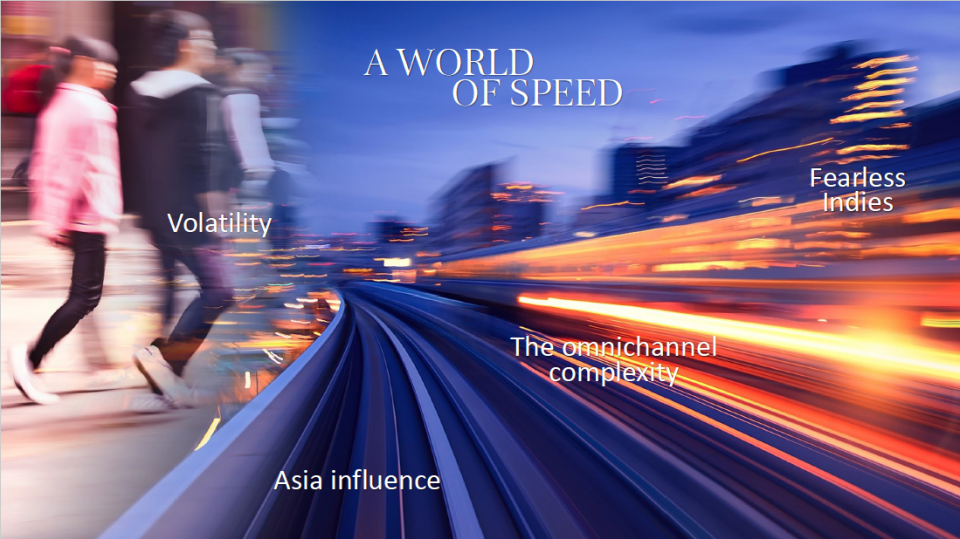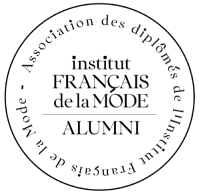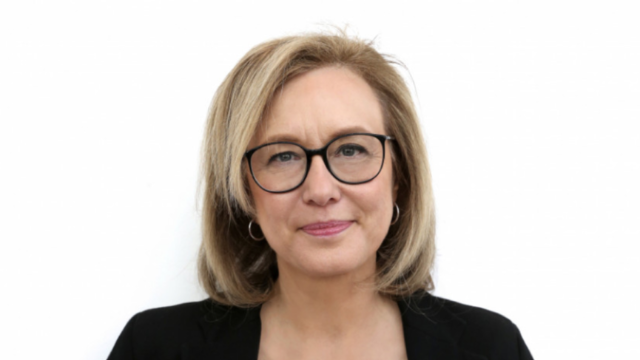Dear alumni,
We are pleased to share with you the interview of Katalin Berenyi, Global General Manager of Clarins. She is sharing with us her experience and her vision of the future in this interview and has been interviewed by Béatrice Ferrié leading the Cosmetics and Perfume Alumni Pole.
Katalin Berenyi (IFM Management 1996) graduated first from the ENSAD (Ecole Nationale Supérieure des Arts Décoratifs) of Paris. She then joined the IFM (Institut Français de la Mode) from which she is graduated of the Management Master. Last, she also has an MBA diploma in Finance from the Jones Graduate School of Business – Rice University, United States.
Katalin began her career in the fashion industry in the marketing department of Pierre Cardin. She then quickly joined the L'Oréal group, in which she worked in the marketing departments of several beauty brands. On the rise in her career, when she held a position of Marketing Travel Retail Director for the luxury division, she decided to leave the group in order to create her own business.
And that’s when in 2007, Katalin created the Erborian company, the first brand to invent and launch the BB cream, a concept which will be taken up and adapted by many competitors later on. An entrepreneurial experience that will influence the world of cosmetics. She led and developed the company for more than 8 years before selling it to the l’Occitane group for which she will work for a few years in order to ensure the transition.
In 2019, Katalin joined the Clarins group as Global General Manager in order to participate in the company development. The group is refocusing on beauty following the sale of its fragrance brands to the L'Oréal group.
Last, Katalin is the author of a very inspiring book: « Les 11 lois du marketing créatif » in which she shares her experience and some of the tools she was able to use during her entrepreneurial adventure. This book is dedicated to all modern-day fighters, entrepreneurs or employees who wish to bring a dose of creativity in their personal or professional life and be inspired by the concept of “Petit Poivre”: small is the pepper but strong!. You can easily find an e-book version on the Internet.
Before sharing Katalin's interview with you, we would like to warmly thank her for her availability and generosity in sharing her experience. Thank you Katalin!

1/ Katalin, you are passionate about beauty and we are curious to know, what is your favourite cosmetic ingredient?
This is an interesting question and frankly, I do not have any because I do not believe in a specific ingredient but in a set of ingredients. Indeed, it is never a single ingredient that can have an action in cosmetics but a blend. Sometimes, we make the mistake of pushing an ingredient to the maximum in a formula and unfortunately, this can lead to skin allergies. Simply because the dosage is not the right one. I will use an Asian expression speaking of a synergy of several ingredients and actives used in the right dosages in the same formula. It is much more effective and respectful of the skin, thus avoiding problems of saturation or allergies. Indeed, sometimes you do not know where a reaction to a cream comes from and it can be simply because some ingredients are overused. Of course, some popular ingredients are very much liked and known by the consumers: the hyaluronic acid, which is very effective in plumping the skin or peptides and collagens which are very effective against wrinkles, but they rely on a on multiple ingredients formula effectiveness. At Erborian, I also worked a lot with high performance fermented ingredients. The size of the peptides through this production process allows optimal penetration into the skin. In any case, it is never a single ingredient that is effective, it is always a set of ingredients and a synergy of active ingredients proving effectiveness.

2/ What program did you take at IFM and why did you choose it?
I joined the IFM in 1994 after my studies at the ENSAD. At that time, the school was still located rue Jean Goujon and was a very small one compared to today. The management program I followed was recent. I chose it because I was looking for a more business oriented program and in that sense, the management program was unique at that time. Didier Grumbach was Studies Director during my schooling. And we were fortunate enough to have extraordinary people coming to give us some lessons, like Pierre Bergé for example. I would say that some people you can meet at the IFM will stay in your memories all your life. You will remember what they said sometimes through a simple sentence ... that will make you think differently.
3/ What link do you have with fashion and creation today? How did the management program help you through your career?
With an art and design background before joining the IFM, I was already passionate about creation and very comfortable with the creation process. What I lacked back then were the marketing and sales tools. How do you turn a creative work into something that will generate revenue and sales?
The IFM program opened my eyes on the fact that these tools were a must have for me to grow further. The program I followed at the IFM allowed me to connect my creativity to a more business vision and enabled me go into the details of the marketing mix: product portfolio, assortment and distribution strategies… Subjects extremely well taught at the IFM. This even further developed my will to learn. Indeed, 2 years after the IFM and after having moved to the United States, I did an MBA. I therefore ended up my studies with marketing and sales driven trainings.
To summarize, I would say that creation is my original training and still drives me. I completed it with a more business vision thanks to the IFM at the end. Today, I am often asked if I did miss creation in my previous marketing roles or if I do miss it today in my role as a business leader. In fact not at all because I always create but differently. By that I mean that I do not draw anymore as I used to during my first professional experience (well I still draw for fun today). I put my creativity at the service of a business, a client or a brand through a way of thinking and a vision.
4/ What values do you favour the most in your work within a company? And as an entrepreneur based on your experience as Erborian co-founder?
I think that over the years certain values become more and more important in our lives for most of the people of my generation. Having said this, the new generation is also very keen in respecting their own values (I have three daughters who are also very sensitive and committed to their values). For my generation, the values that a company carries are fundamental in choosing whether to join it or not. In my decision to join Clarins, this point was fundamental: I had a real connection with the Clarins values; it was like a natural connection. The company shares values that are important to me: the requirement, the will to innovate, the desire to always do better, to understand the customer, to bring something new, the ability to question oneself, the sincerity, transparency, authenticity, the will to be oneself and not to try to look like… and finally the benevolence. These values are extremely constructive and important to me.
5/ Do you use the IFM Alumni community for advice, networking or anything else?
I do it from time to time but certainly not enough and I would like to make myself more available to do it. The last year was indeed very busy with my arrival at Clarins, the company being in full transformation with the sale of its perfume portfolio to L'Oréal. The Clarins brand becomes the center of the company. Our activity is accelerating and our business development strategy is getting stronger. I hope to have more time in the future to involve students in creative projects. I am very opened to this type of project and would love to do it.
6/ You wrote a book in 2011 « Les 11 lois du marketing créatif » in which you already give many tips and tools to your readers. Do you have any new tips today to share with the IFM Alumni community?
This book was like a memento for me. I was not necessarily looking for giving advice or did not want to let people think that I was going to explain to them what to do. I do think that everyone has his or her own journey.
I wrote this book to share my deep beliefs, beliefs that were built while moving from a big company to entrepreneurship. I realized back then that the "toolbox" useful in big companies was different from the one useful as an entrepreneur. I wanted to offer a concrete guide that brings the two together. The fundamental tools discussed in the book have not changed today. For example the creativity is still a must have today to attract consumers and to differentiate from the competition.
In the book, I also mention the fact that distribution channels differentiation is not where to start from since the customers can go and shop in several channels. One of the fundamentals is indeed to think "customer" rather than targeting only an established type of distribution when building a brand. This is even more true today. I was challenged a lot on this point when the book came out: "But Katalin, you cannot target distribution in pharmacies and at Sephora ...! » Ah yes and why not? It is the same customer who goes to both stores, isn't it? When I wrote the book, I based my analysis on my professional experiences but also on common sense and customer observation. I realize today that this analyze related to “thinking customer first” is even more true. Since that book, I sold Erborian to the l‘Occitane group. I worked for the group as "Chief Creative Officer" for a few years before to leave them to join Clarins. So I came back to a large company.
Being an entrepreneur and working for a company require different skills. You need to work with different "muscles", different types of flexibility and adaptability... Being an entrepreneur is exciting. You can listen to yourself, go towards your desires and you feel responsible for your success. I say "feel" because success depends on many factors. Some brands are sublime but yet file for bankruptcy… It breaks my heart because I know the quality of the formulas and I know that great a job has been done for some of them. However, for different reasons it did not work out, even though the brand deserved it. It is a big "learning".
You should never take things too personally. What depends on us as an entrepreneur is actually a small part of the success. There are always more than half of the success factors that are beyond our control. It is not because it does not work once that it cannot work the second, the third, the fourth time ... Tenacity is really important today. Engaging very strongly in your project without personally taking the non-success or the success is important too. Because an entrepreneurial project always escapes us at some point. Sometimes the stars are aligned and it works - and sometimes not. And the next time it will work better. Today even more than yesterday tenacity, positivism and benevolence are essential qualities to succeed.

7/ Do you have Katalin, advice or more personal tips on how you get inspiration or recharge your batteries?
I do not think that I am different from the others on this point. I try to have a healthy lifestyle and get enough sleep. I have a very well balanced family. My husband sometimes tells me when I am not getting enough rest. Sometimes he asks me to come home earlier… because when I am working I forget the time and work for very long hours. I think it is important to maintain an overall balance. Today my children are grown up so I do not have to take care of them like I used to. I have more time and it is easier for me. Having said that, when my children were young I was at L'Oréal and then Erborian and I also worked a lot. But when you are a woman and a mom, you still manage to make it happen. To recharge my batteries, I also try take care of myself. I think we, women, do not often give ourselves the permission to take care of ourselves and I think that we have to learn to do it more. It could be just taking a bath, or not making dinner, or spending time on the phone with a friend, watching Netflix series… We all function like “batteries” and recharging ourselves is essential. Finally, I read a lot. My choices are diverse and that also helps me a lot. For those who like reading, I recommend the following books to the IFM alumni:
-The Power of Moments: Why Certain Experiences Have Extraordinary Impact de Chip et Dan Heath
-Start with Why de Simon Sinek
-The Decision Dilemma -- Cognitive Bias de William P. Stormer
-Lovemarks by Kevin Roberts

8/ Katalin, in the current economic context and COVID crisis, what is your vision for the future...?
I think that we are going to have a few more difficult months until the end of the year or even the first quarter. It was very difficult to shut down the whole distribution for three to four months. Now that the points of sale have reopened, sanitary measures prevent us from engaging with customers in the same way. For example, we no longer use testers in stores. This context will push us forward. If we try to do as before, it will not work. The Covid makes us and will make us think differently. The world will change...
To come back to this story of testers, for me the challenge is to understand what we could invent that would allow women to test the products and discover the beauty of the textures despite the constraints. Asking the question differently leads to a different answer. Instead of asking “how to use testers given current constraints ..." will should ask ourselves "how to make customers discover the beauty of our products in the current context".
In addition, the Covid has changed the way of consuming. At Clarins, we have nearly doubled the online sales. And many more changes are about to come. E-commerce will evolve further and faster. The relationship with the customer and the social networks as well. I am convinced that this crisis will bring a multitude of opportunities if we ask ourselves the right questions and if we do not try to do as before. Things will never be as they used to be. Companies are realizing, for example, that working from home works very well, that customers are looking for even more simplicity and authenticity. The true taste of things and the personality of each become more and more important. Companies will have to question themselves and it is possible that new "jobs" be created, new needs appears, that a completely reinvented digital sphere emerges.

9/ A last word to the IFM alumni?
Yes, I would like to mention that the IFM is a wonderful community. I do not know any other network so strong and made of so many passionate people. The different type of expertise and jobs in fashion and luxury are represented in the community with unique know-hows around creativity and business issues. It is a nice mix of left and right brains. There is no other school offering this, at least not to my knowledge.
Béatrice Ferrié ( eMBA GFM 2016-2017)

Comments0
Please log in to see or add a comment
Suggested Articles



